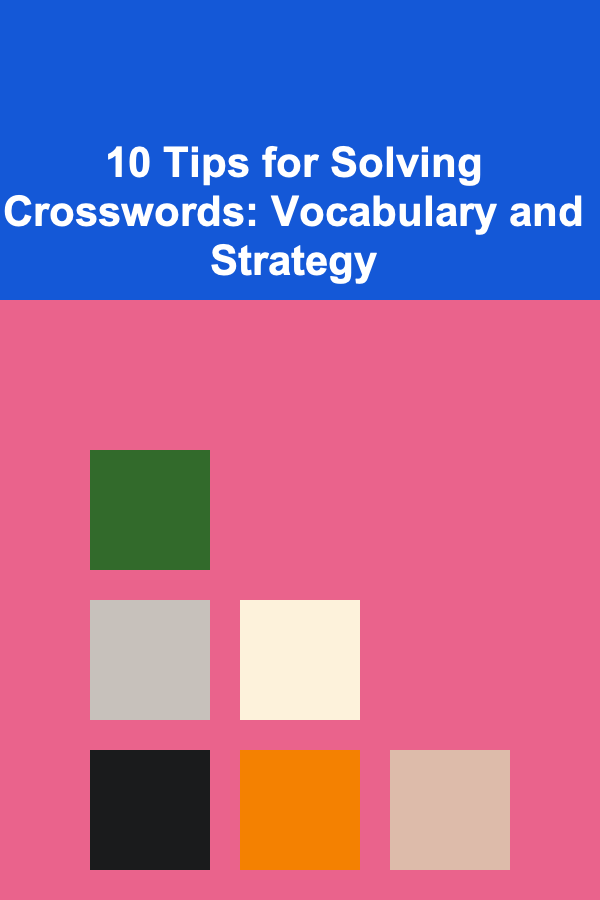
10 Tips for Solving Crosswords: Vocabulary and Strategy
ebook include PDF & Audio bundle (Micro Guide)
$12.99$11.99
Limited Time Offer! Order within the next:

Crossword puzzles have long been a popular pastime for word enthusiasts, test-takers, and casual solvers alike. The challenge of piecing together clues to form words can be both fun and rewarding, while offering cognitive benefits like improving vocabulary, enhancing problem-solving skills, and stimulating the mind. But solving a crossword puzzle, especially the more difficult ones, can seem like an intimidating task, especially for beginners.
Whether you're a seasoned crossword solver or just starting out, having a strategy in place can make the experience far more enjoyable and successful. In this article, we will walk you through ten expert tips for solving crosswords, focusing on both vocabulary-building techniques and strategies that will help you tackle the toughest puzzles with ease.
Start with the Easy Clues
When you first sit down to tackle a crossword puzzle, it's tempting to dive straight into the most difficult clues. However, a good strategy is to begin with the easiest clues first, which are often the shorter, more straightforward answers. These simple clues will provide you with a foundation to build on, allowing you to fill in the grid and give you a sense of accomplishment early on.
By starting with the clues you are confident about, you can gradually fill in the puzzle and eliminate potential mistakes. As you add answers to the grid, they will offer valuable letter combinations that can help you solve more challenging clues later.
Tip:
Look for clues that reference common knowledge, such as capitals, popular culture, and basic facts. These are usually easier to solve and provide crucial building blocks for the rest of the puzzle.
Master Word Endings and Prefixes
Understanding common prefixes, suffixes, and word endings can significantly improve your ability to solve clues. In crossword puzzles, many answers follow predictable patterns based on the language's structure. Some examples of frequent word endings are:
- -ING for verbs (running, swimming)
- -ED for past-tense verbs (walked, jumped)
- -EST for superlatives (largest, fastest)
- -TION for nouns (nation, creation)
- -LY for adverbs (quickly, softly)
Recognizing these patterns will help you guess possible answers when you're stuck on a clue. For instance, if a clue is "Past tense of eat" and you know the word must end in -ED, you can immediately think of the word "ate" and form "eaten."
Tip:
If you're uncertain about a clue, try filling in a word ending based on your knowledge of common suffixes or prefixes. These patterns can help you narrow down the possibilities quickly.
Use the Crossing Letters Wisely
In crossword puzzles, the intersecting letters between horizontal and vertical clues provide an invaluable resource for solving clues. As you fill in the grid, pay close attention to the crossing letters and use them to inform your guesses for other clues.
For example, if you know that a certain vertical word ends with a "T" and the horizontal word shares that letter, use it to narrow down the options for the horizontal word. This technique allows you to work more efficiently by focusing on how the answers interact with one another.
Tip:
If you're stuck on a clue, focus on the letters already filled in to help you identify potential words. Working with the crossing letters can be a game-changer when solving challenging clues.
Expand Your Vocabulary
Crossword puzzles are a fantastic way to expand your vocabulary and learn new words. Many puzzles use obscure or rare words, which can be intimidating at first, but they're also an excellent opportunity to learn and grow as a solver.
One way to improve your vocabulary is to read books, newspapers, and articles in a variety of genres. The more exposure you have to different words and phrases, the easier it will be to recognize unfamiliar words when solving crosswords. Additionally, using a thesaurus can help you discover synonyms and alternative word choices that may show up in puzzles.
Tip:
When you encounter an unfamiliar word in a crossword, take the time to look it up and learn its meaning. This will help reinforce your vocabulary for future puzzles.
Look for Clue Patterns and Wordplay
Crossword puzzles often feature clever wordplay, such as puns, double meanings, and cryptic clues. Being able to spot these patterns and types of wordplay is key to solving many clues. For example, a clue might be a play on words, like "Horses' food" (answer: hay), or it might involve a synonym or homophone.
Some common forms of wordplay to look out for include:
- Anagrams: Rearranging the letters of a word or phrase to create a new word.
- Homophones: Words that sound the same but have different meanings or spellings.
- Abbreviations: Shortened forms of words, such as "Dr." for doctor or "Ave." for avenue.
- Cryptic clues: Clues that have hidden meanings and require you to think outside the box.
Tip:
Practice recognizing clues that involve wordplay and think creatively about how the words can be interpreted. This will help you tackle tricky clues that rely on clever language tricks.
Use a Crossword Dictionary or Thesaurus
When you're stumped by a crossword clue, having a reference tool can be incredibly helpful. A crossword dictionary or thesaurus is a great resource to look up possible words that fit the number of spaces and the crossing letters. These tools are especially useful when solving puzzles that use uncommon words or technical terms.
If you prefer a more hands-on approach, you can create your own crossword dictionary by writing down words you encounter frequently and their meanings. This will help you build a mental reference library that you can use during future puzzle-solving sessions.
Tip:
Use a crossword dictionary sparingly. Relying too much on outside help can hinder your development as a solver. Instead, try to challenge yourself and expand your vocabulary through practice.
Pay Attention to the Puzzle's Theme
Many crossword puzzles have a central theme that ties together the clues and answers. Identifying the theme early on can provide valuable insights into the puzzle's structure and guide you toward the correct answers.
For example, a puzzle might be themed around a specific holiday, famous historical figures, or popular phrases. If you can identify the theme, you can make educated guesses about the answers to some of the clues.
Tip:
Look for clues that seem to fit the theme or offer hints about the central concept. Recognizing the theme will help you connect the dots and solve the puzzle more efficiently.
Practice Regularly
As with any skill, practice is key to becoming proficient at solving crossword puzzles. The more puzzles you complete, the more you'll improve your vocabulary, problem-solving skills, and overall strategy. Set aside time each day or week to solve puzzles, and challenge yourself with puzzles of varying difficulty levels.
With regular practice, you'll become more familiar with common crossword conventions and word patterns, making it easier to solve even the most difficult clues.
Tip:
Start with easier puzzles and gradually increase the difficulty level. As you get more comfortable, you'll be able to tackle harder puzzles with confidence.
Don't Be Afraid to Skip and Return Later
Sometimes, a crossword puzzle can become so difficult that it feels impossible to make progress. In these moments, it's important not to get frustrated. Instead, skip over the clue and return to it later. Moving on to other clues can help you gain new insights or provide additional crossing letters that make the original clue easier to solve.
By coming back to difficult clues with fresh eyes, you may be able to spot solutions you missed earlier.
Tip:
Take breaks when you feel stuck. Stepping away from the puzzle for a while can help clear your mind and give you a new perspective.
Have Fun and Enjoy the Challenge
Ultimately, crossword puzzles are meant to be enjoyable. Don't get bogged down by difficult clues or mistakes---remember that the goal is to have fun and challenge yourself. Whether you're solving puzzles for relaxation, learning, or competition, the sense of accomplishment you feel when finishing a crossword is what makes it all worthwhile.
Tip:
Celebrate your progress and enjoy the process of solving. Over time, your skills will improve, and you'll find even greater satisfaction in completing puzzles.
Conclusion
Solving crossword puzzles is both a fun and intellectually stimulating activity that improves vocabulary, boosts cognitive abilities, and sharpens problem-solving skills. By following these 10 tips, you'll be well on your way to becoming a crossword-solving expert. Practice regularly, stay patient, and most importantly, enjoy the process!
Reading More From Our Other Websites
- [Metal Stamping Tip 101] From Blank to Brilliant: A Step‑by‑Step Guide to Crafting Copper Stamped Artifacts
- [Home Budget 101] How to Reduce Home Expenses: 10 Simple Strategies for Savings
- [Personal Care Tips 101] How to Maintain Brain Health as You Get Older
- [Home Storage Solution 101] How to Store Books in Small Spaces with Creative Solutions
- [Personal Care Tips 101] How to Build a Minimalist Personal Care Routine: Less is More
- [Scrapbooking Tip 101] The Minimalist Scrapbooking Challenge: Stunning Pages with 5 Items or Fewer
- [Organization Tip 101] How to Use Multi-Functional Furniture for Space Saving
- [Organization Tip 101] How to Choose the Right Catering Service for Your Event
- [Home Rental Property 101] How to Find Houses for Rent with a Formal Dining Room
- [Home Security 101] How to Secure Your Garage Doors: Tips for Better Home Protection

How to Install Smart Locks for Enhanced Home Security
Read More
How to Make a Checklist for Food and Water Storage in an Emergency
Read More
How To Understand Quantum Computing for Drug Discovery and Design
Read More
Waiter's Guide: Mastering Upselling Techniques for Increased Sales
Read MoreHow to Use Your Asset Allocation Tracker for Retirement Planning
Read More
10 Tips for Maximizing Investment Interest Expense Deductions
Read MoreOther Products

How to Install Smart Locks for Enhanced Home Security
Read More
How to Make a Checklist for Food and Water Storage in an Emergency
Read More
How To Understand Quantum Computing for Drug Discovery and Design
Read More
Waiter's Guide: Mastering Upselling Techniques for Increased Sales
Read MoreHow to Use Your Asset Allocation Tracker for Retirement Planning
Read More